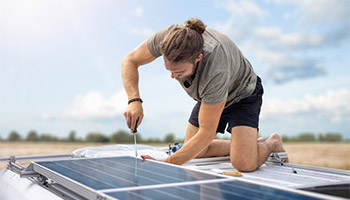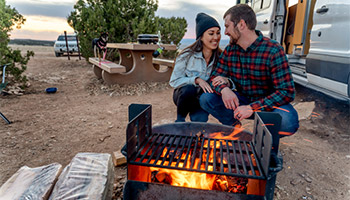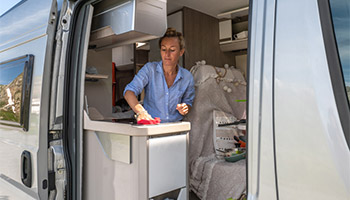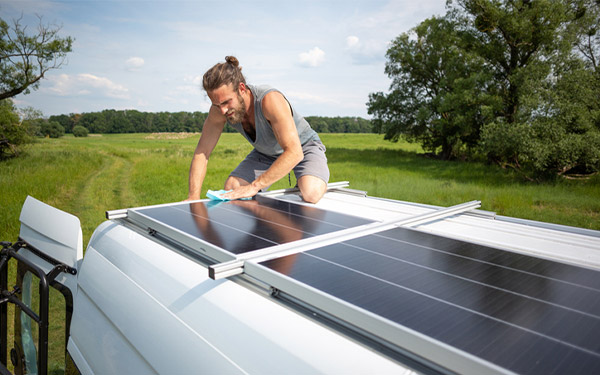There’s no better feeling than coasting to your next adventure in your RV. But no matter how much we love to travel, it’s more important than ever to look for ways to reduce our overall ecological footprint. While RVs aren’t typically known for their green features, it is possible to make your RV eco-friendly. Here are seven tips for going green in your RV.
1. Focus on Fuel
When looking for ways to make your RV eco-friendly, start by focusing on fuel efficiency. To do this, begin by lightening your RV’s load. Getting rid of the extra “nice to have” or “just in case” items you’ll likely never use could help improve your RV’s fuel efficiency. In addition, performing regular maintenance and adjusting your tire pressure will keep your RV performing at its best.
2. Use Energy Wisely
Once on the road, consider making changes to improve your RV’s energy efficiency. Here are a few changes that we recommend:
- LED lights: Switching your lightbulbs and lighting for their LED counterparts is often an easy and affordable change for most RVs.
- Energy-efficient appliances: If you have older appliances in your RV, it may be time to upgrade them for their energy-efficient alternatives. From refrigerators to microwaves, consider swapping out as many as you can.
- Park smart: To minimize the usage of your RVs AC/heater, park strategically. On hot days, park your rig in a shaded area when possible. On colder days, aim to park in direct sunlight.
3. Install Solar Panels

Installing solar panels in your RV may be a costly upgrade, but the investment could pay for itself over time. If you’re a full-time RVer, there’s no cleaner way of powering your RV and appliances than solar energy. Not ready for roof-mounted solar panels? Consider portable solar panel systems. With a portable solar panel system, you can choose when to collect energy and routinely change panel placement to increase sun exposure. If opting for a portable system, remember that they’ll need their own storage space and may require additional setup.
4. Reduce, Reuse, and Recycle
While it’s easy to want to bring everything on the road with you, doing so will lower your ability to be eco-friendly. When RVing, follow the 3 Rs of waste management: reduce, reuse, and recycle.
By reducing the number of products on board, you are simultaneously reducing the amount of potential waste within your RV. When shopping for your essentials, consider items that are easy to reuse. You’ll also free up additional storage space by opting for reusable plates, cups, and other products. Finally, always recycle. Recycling is one of the best ways RVers can make RVs eco-friendly, whether by exchanging your plastics and cans, or repurposing old fabrics.
5. Campfire Cooking

Instead of relying on stoves powered by gas or electricity, consider cooking over a campfire or grill whenever at a campsite. Not only will this help conserve energy, but it’ll also prevent excess heat from being produced in your RV on warmer days. You’ll have access to a campfire grill on most campsites, but you can also choose to carry your own portable grill. Of course, whenever cooking at a campsite, it’s essential to follow campfire safety.
6. Utilizing Eco-Friendly Cleaning Products

The cleaning products and septic treatments you use in your RV can harm the environment. When possible, try to find cleaning products that are biodegradable and eco-friendly. Not only will the environment thank you, but you can also save money by creating your own solutions using household items such as vinegar, water, lemon juice, and baking soda.
7. Install a Composting Toilet
Consider installing a composting toilet when planning ways to make your RV eco-friendly. A composting toilet will help reduce your water use in general, but it can also be a more effective way of disposing your waste.
Composting toilets work as a self-contained system that separates liquid and solid waste from each other, which helps to prevent any unpleasant smells from forming. To get rid of your liquid waste, you can still use your RV’s black water tank. For solid waste, you’ll have to dispose of it according to your state’s regulations. Before making the switch, be sure to research the pros and cons of a composting toilet thoroughly.
Don’t Forget About RV Insurance
No matter how you decide to adventure in your RV, having the right insurance is essential. We recommend purchasing specialty RV insurance that is separate from an auto policy to maximize your coverage. To learn more about how to insure your RV properly, call our RV Insurance Specialists at (866) 501-7335.
The information in this article is obtained from various sources and is offered for educational purposes. Furthermore, it should not replace manuals or instructions provided by the manufacturer or the advice of a qualified professional. No warranty or appropriateness for a specific purpose is expressed or implied.
